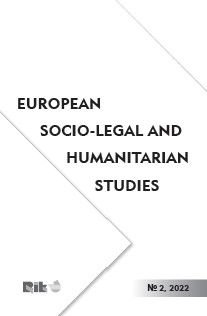RESTRICTIONS ON THE RIGHT TO CONCLUDE A PEACEFUL AGREEMENT IN THE CIVIL PROCEDURE OF POST-STATE STATES: COMPARATIVE LEGAL ASPECT OF RESEARCH
RESTRICTIONS ON THE RIGHT TO CONCLUDE A PEACEFUL AGREEMENT IN THE CIVIL PROCEDURE OF POST-STATE STATES: COMPARATIVE LEGAL ASPECT OF RESEARCH
Author(s): Sibilla Buletsa, Vasyl Fennych, Ivan YurashSubject(s): Civil Law, Comparative Law
Published by: Editura U. T. Press
Keywords: civil process; post-Soviet countries; peace agreement; restrictions;
Summary/Abstract: In this article, the authors analyze the legislative restrictions of post-Soviet countries on the impossibility of exercising the right to conclude an amicable agreement in civil proceedings. An analysis of the normative enshrinement of these legislative restrictions and concluded that the legal institution of amicable settlement should be enshrined in the first sections of procedural codes with a detailed description of the amicable settlement procedure and reservations about the impossibility of this, as it belongs to the general part of civil procedural law. Such an approach will help to save the normative material in the codified act and adequately apply the institution of amicable settlement by all courts. Restrictions on the right to conclude an amicable agreement in civil proceedings by the authors are divided into three groups. These groups of restrictions on the right to conclude an amicable agreement are analyzed in terms of substantive and procedural law of post-Soviet countries, the practice of its application by the judiciary and the legal doctrine prevailing in the state. As a result of comparative legal research, it was concluded which restrictions on the right to conclude an amicable agreement should be left, and which should be abandoned or not allowed such wording.
Journal: European Socio-Legal and Humanitarian Studies
- Issue Year: 2022
- Issue No: 2
- Page Range: 30-46
- Page Count: 17
- Language: English

